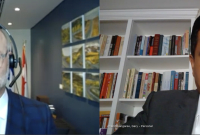Bruised but not broken, Green Party heads east to regroup its grassroots

The federal Greens are kicking off 2023 with a visit to Atlantic Canada as the party tries to rebuild support across the country.
In recent years, the party has been dealt some harsh blows, from Fredericton MP Jenica Atwin’s defection to the Liberal Party to divisive infighting during Annamie Paul’s rocky tenure as leader.
This week, Green Party Leader Elizabeth May and deputy leader Jonathan Pedneault are visiting Nova Scotia, P.E.I. and New Brunswick to connect with party members, supporters and Green MLAs. May and Pedneault ran for the leadership together last fall, and if Green Party members’ votes make a constitutional change to the leadership structure, they will become co-leaders.
“We are in the process of rebuilding the party, there’s no mistake about that,” May told Canada’s National Observer in an interview. “This is part of the country that we missed in the leadership race,” she said, noting the destruction from post-tropical storm Fiona delayed a previously planned trip. “Making sure we've done everything we can to listen to Greens at the grassroots” is a priority for this trip, said May.
Some provinces in Atlantic Canada are strongholds for provincial Greens, but others, like Newfoundland and Labrador, have never had a provincial Green Party.
“I wouldn't make the assumption that just because the Green Party did really well provincially here in our last election that the federal party will do well. In fact, the evidence is rather clear, and they did not do well in 2021,” said Don Desserud, a professor of political science at the University of Prince Edward Island. The Green Party got 2.3 per cent of the popular vote in the 2021 election, down from 6.5 per cent in 2019.
However, May’s time living in Nova Scotia as a young adult and remaining family and local connections kept her coming back frequently as leader, “so it's friendly territory for them,” said Desserud.
When your party has gone through some trauma and you’re trying to get back on your feet, one way to do that is to start off in a place where people are going to treat you well, he said.
Atlantic Canada is “a good, safe place to do a trial run on a campaign,” said Desserud. Parties can see how their logistics team is working and treat it like a focus group to figure out which speaking points work, identify issues and work out any kinks in the operation. This is why you often see federal politicians visiting Atlantic provinces early in their campaign, he explained.
Last spring, then-interim leader Amita Kuttner went on a countrywide tour to mend wounds and reconnect with members after the 2021 election’s bleak outcome, which saw then-incumbent MP for Nanaimo-Ladysmith Paul Manly lose his seat.
Pedneault has spent the previous week in Newfoundland and Labrador getting to know the concerns of supporters and community members, he told Canada’s National Observer in an interview. It was the Québécois human rights activist’s first visit to the province, and he heard from people about Newfoundland and Labrador’s “tricky” economic situation and its intersection with climate and environment.
“It's a province … where a lot of work, a lot of jobs are linked to the oil industry,” said Pedneault. Over the last 20 years, the oil and gas sector has accounted for 25 per cent of Newfoundland and Labrador’s GDP. Oil companies are being invited to explore for oil off its coast, and by 2028, pending any delays, the country’s first deepwater oil site will be operational.

Pedneault said party supporters in Newfoundland and Labrador “had a hard time over the past two years and felt quite abandoned by the central party.”
The province has had its share of economic hardship in recent decades. The 1992 cod fishery collapse affected more than 35,000 jobs, and the federal government recently had to give the province a multibillion-dollar bailout package thanks to a costly hydroelectric megaproject.
Because of this, Pedneault says a lot of people are excited about the possibility of producing oil off the shore of Newfoundland despite knowing about the technical, environmental and safety challenges of the project.
“They need the jobs, and that's the economic reality of this province.”
To him, this reality, coupled with the impacts of extreme weather events on the province and its people, highlights the need for a just transition powered by clean energy investments.
May met Pedneault in Halifax on Sunday to kick off the joint portion of their visit, which will feature public lectures on bipartisan topics and meetings with supporters and Green MLAs. The pair will meet with P.E.I.’s official Opposition leader, Peter Bevan Baker, and his caucus in Charlottetown. In 2019, the party won eight seats and made history as the first Green Party to form the official Opposition. Then, in Fredericton, May and Pedneault will pay a visit to Green Party Leader David Coon and his caucus.
“It's always very useful for small parties to talk to people who were in the same situations as they were: didn't have any seats, got a foothold and then built and then had success,” said Desserud. Someone who’s savvy like May will be able to translate those lessons learned to help the federal Green Party’s cause, he said.
This visit will be the first of many to the Atlantic region and across Canada, said Pedneault, calling it a priority for him this year.
“We have to be realistic here. It's been a difficult two to three years for the party, so we have to rebuild,” he said. Fortunately, there are good members who remain involved despite the turmoil, Pedneault added, noting the party is working with them to build a foundation so on the next visit, there will be a few more people and a few more the time after that and the next time.
“It's a long-haul effort. We have a long, steep hill to climb,” he said. “But we're at least meeting a lot of goodwill from people, and that's encouraging.”
Natasha Bulowski / Local Journalism Initiative / Canada’s National Observer







Comments
Thing is, will they address what led them to elect a Zionist convert leader??? There is no such thing as a Green Zionist....you can't support a just transition here and turn a blind eye to genocidal policies justified by your belief in your tribes "chosen' status.
Too often, we work harder to "justify" conditions that are part of an old world order, than we work to create a Just Transition. Until Greens acknowledge the gap between Justify and Justice.....and distance themselves from racist propaganda, their commitment to a low carbon future will be compromised. There are no chosen few, or advantaged petro states, on Hot House Earth.
Never mentioned is the cross on Elizabeth May's chest that seems to just get larger and shinier and signals identification with the "Holy Land" that's intrinsic to BOTH Muslims and Christians. An ongoing problem, to say the least, but Christians have more boldly appropriated the God idea, insisting that "He" apparently "gave" the land of Israel to "His" chosen people, the Jews. Which justifies and animates "Zionism" whereby all Jews should be able to "return" to Israel.
All of this sounds like we're discussing the "Game of Thrones" but vast numbers of people have actually (and truly unbelievably) succumbed to this first and worst "big lie" while still trying to present themselves as rational people but they're not, because it's still just a myth. A figment of the human imagination.
The damning and disturbing context of religion easily disappears when it's so ubiquitous AND when considering the obvious goodness of Elizabeth May and her Green Party who brought climate change into politics where it so urgently needed to be. But when we consider how close "holier than thou" is to "virtue signalling" and "lording" something over someone, you have one of the valid criticisms of the left by the political right. There's always lots of hypocrisy to go around as it is when it comes to people (like how the right wing is in fact disproportionately MORE religious than the left) but when our best, most tolerant, and most humane human behaviour is disconnected from US, enlisting the messy murk of religious "righteousness" as our agent or our sanction, our credibility also disappears. And chaos ensues.